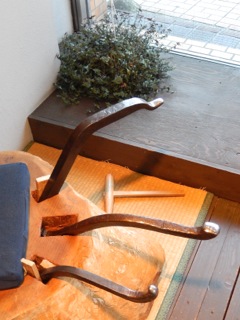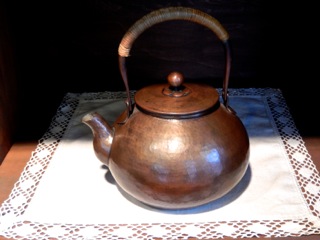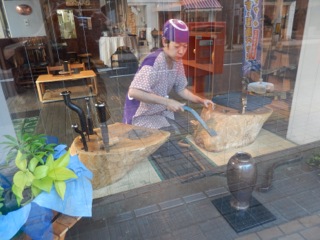June 2015
Dear Family and Friends,
Every now and then life allows us the privilege of meeting someone particularly pure. When that happens, things seem to shift ever so subtly. And then the world becomes more promising and hopeful. Recently such a person crossed my path. And since his story is rather unique, I would like to share it with you.
The other day a friend showed me a pamphlet that he had received from a shop owner down the street. It had photos of exquisitely executed copper items: bowls, vases, cups, and pitchers. The work seemed very modern. And yet, there was a distinctly traditional Japanese essence to each piece. I was fascinated, so went to find the workshop. And there, to my surprise, right in the large storefront window, a young man in traditional clothes was hammering away at a copper bowl.
“Excuse me. Would it bother you if I came in,” I queried with a bow.
The gentleman looked up, rather surprised to see a foreigner. When I explained what got me to his shop, which was impeccably clean and orderly, Zen Tanaka San beamed with delight and invited me in. Then he showed me his neatly arranged tools: some wooden and some metal, some heavy and some light.


He explained that the craft had been done by his family since 1596. In fact, he was the 19th generation of craftsmen. I was impressed, of course, especially for this to happen in Sendai. Until very recently Tohoku was considered a rather backward, uncultured part of Japan. In order to keep the business going, however, the family wisely moved into a very solid avenue economically. They make boilers. So, one side is very artistic, creative, and imaginative, while the other is down to earth and practical. “That’s how we have lasted for 400 years,” Zen San said proudly.
Zen San gave me a brief tour of his shop, showing me one stunning piece after another. He explained that designs were based on traditional motifs, but he would adapt them according to each person’s wishes. In other words, each item was individually designed, and therefore unique.


Zen San went on to tell me how he had learned this craft. He never finished high school, considering it a waste of time. Instead he stepped out into the world, floundered a bit, but finally settled back into his family business as an apprentice coppersmith. At that time there were twenty craftsmen, all well over sixty. Zen San was only fifteen, but he was eager to learn. One of these gentlemen took Zen San under his wing and mentored him with great care and precision. Zen San learned well. After two years, he was allowed to make his own piece solo. It has a place of honor in his shop today.

At eighteen, Zen San realized he wanted to learn even more, so applied to an art university that had courses in metalwork. The administration was open minded enough to honor his years of work experience, so accepted him into the program. Zen San absorbed all he could. He moved beyond pragmatic items and began experimenting with other ideas. His work became more delicate and more his own. After two years, he left university, returned to Sendai and opened his own shop in the front of his family’s boiler business.
Now his studio faces the street, so any passersby can see him pounding away on one of his pieces. He is the only craftsman, since all the others have retired. In fact, Zen San may be the only coppersmith left in all Tohoku. It is impressive that someone so young is keeping up the tradition, and doing quite well.
He is successful because each of the pieces he designs is individually crafted and made to order, so no two are alike. In a subtle way, each item carries the essence of Zen San’s skill, and also the long history of his family trade.
I asked him how the events of 2011 affected his business. That was a time when people could only focus on survival, nothing extra. Zen San told me he stopped working for two years, married, and had twins. The shattering events of March 11 were a wake up call. He had always lived outside the norm, but when the world turned upside down, he realized even more strongly that his life had to be his own. Living it each day fully focused, creating, caring, and loving are all that matter to him now. And he hopes to instill those values into his children, whom he adores.
I listened to this lovely young man, so pure, and so full of creativity, skill, and training. And I realized he manifests what Tokoku is struggling so hard to bring about: a creative rebuilding into the future, while being appreciative of all – absolutely all – that has come before.

Love,
Anne
 0
0 












